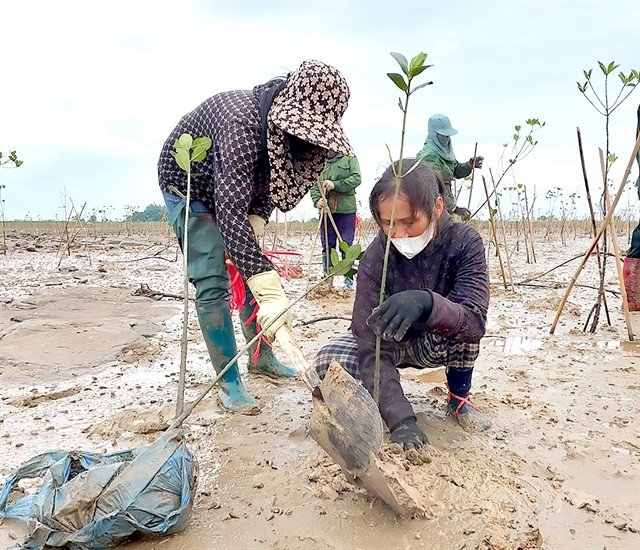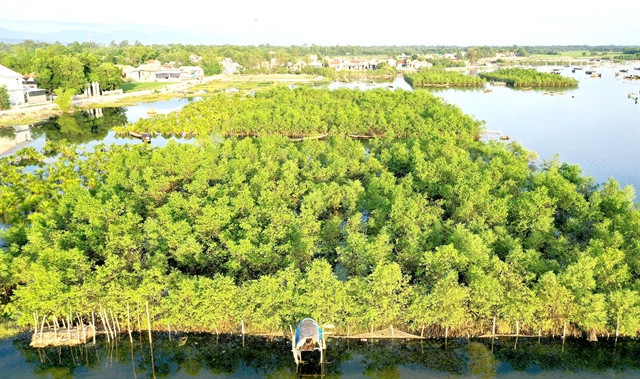 |
| Planting mangroves in the coastal areas of Quảng Ninh Province. — VNA/VNS Photo Bích Hồng |
Coastal forests do not provide wood like plantations do, but they are quite valuable, especially, as Việt Nam is trying to implement solutions to respond to climate change and achieve net-zero emissions by 2050.
During September, the water level in coastal areas in Móng Cái City of Quảng Ninh Province goes down in the evening and rises again the next morning, so people who participate in forest planting such as Phạm Quốc Hải in village 6 of Hải Tiến Commune have to plant forests at night or early in the morning.
Hải said that given the characteristics of the water, weather and climate, this can also be considered the last month of afforestation of the year.
This month, the planting yield will also be much lower than in previous months, he said.
But Hải and the people in the community group who participate in the afforestation project “Modernising the Forestry Sector and Enhancing Resilience in Coastal Areas” are very enthusiastic and actively plant every night to ensure progress.
According to Hai, if they do not participate in afforestation, most people only know how to go to the beach to dig up sandworms.
But seafood resources are increasingly scarce, and the afforestation project brings people a higher income.
“Plant forests and protect forests well. In the future, forests will also produce seafood for people to exploit,” Hải said.
The project called “Modernising the Forestry Sector and Enhancing Resilience in Coastal Areas” sponsored by the World Bank (WB), is one of many ongoing projects to plant, care for and protect coastal forests.
Phạm Hồng Vích, vice director of Afforestation Project Management, said that up to now, about 4,000ha of forests were newly planted and restored, while 37,000ha of forests have received management and protection services fees, which have been contributing to creating 'strips' of coastal protection forests for eight provinces and cities, and supporting localities and people to increase their resilience to adverse weather events and rising sea levels.
According to the forest ecosystem, the structure of mangrove forests has few tree species, but the value of the mangrove ecosystem is huge for people and society because it protects the coast, minimises harmful effects caused by ocean waves, absorbs and stores carbon, and reduces greenhouse gas emissions.
The Forestry Department said that in the world, the economic value of aquaculture supported by mangroves annually is from US$750 - US$16,750 per hectare, and this shows that the value of mangrove forests is huge.
In Malaysia, mangrove water protection services range from US$845 to 1,022 per hectare per year.
Many scientific research confirms that mangroves have the best ability to store carbon among all types of forests. This type of forest can absorb four times more carbon than traditional tropical forests on land. Therefore, the protection, development and expansion of coastal forests including mangrove forests are essential, especially when Việt Nam is trying to implement solutions to cope with climate change.
According to the Forestry Department, Việt Nam has 14.79 million hectares of forest, of which coastal protection and special-use forests account for 276,000 hectares.
Triệu Văn Lực, the Department’s deputy director, said that although the coastal forest area accounts for a very small proportion of the total national forest area, this type of forest plays a very important role in maintaining ecological balance, preserving biodiversity, and protecting coasts and people's livelihoods.
With the huge role of this type of forest, the Prime Minister approved the project of protecting and developing coastal forests to respond to climate change for the 2015-20 and 2021-30 periods.
Lực said that the project has attracted international organisations' attention by investing in many coastal forest development projects.
So far, over 2,800 hectares out of a total of 20,000 hectares in the plan have been planted, said Lực.
 |
|
Mangrove forest in Tam Giang lagoon in Quảng Lợi Commune, Quảng Điền District in Thừa Thiên-Huế Province. — VNA/VNS Photo |
Along with that, localities also planted additional trees to restore and enrich forests of nearly 4,500 hectares out of 15,000 hectares in projects.
Compared with afforestation on the mainland, coastal forest development has additional difficulties.
This is an area strongly affected by natural disasters, including high tides and rising sea levels causing coastal and river mouth erosion, deforestation and difficulties in afforestation.
There have been difficulties in afforestation because many mudflats are so deeply flooded that there is a lack of land for planting.
"In addition, land planned for coastal forests often changes due to the need for land use for socio-economic development,” Lực said.
“The situation of converting land planned for coastal afforestation to other purposes and encroaching on forest land for farming and fishing has affected the progress and results of coastal afforestation," Lực said.
In addition to afforestation, many programmes and projects are investing in coastal protection works such as repairing dikes and embankments, building soft walls to break waves, and retaining mud to create land for afforestation.
For coastal people to develop the economy while protecting and developing forests, there have been several livelihood development models based on forms of forest co-management implemented in Đồng Rui District of Quảng Ninh Province, Xuân Thuỷ District of Nam Định Province, Hải Lăng District of Quảng Trị Province and Âu Thọ District of Sóc Trăng Province.
There are also models combining agriculture, forestry and fishery with lotus growing, beekeeping and raising chickens, sea ducks, shrimp, crabs and fish.
Along with disseminating information and raising awareness among those related to coastal forests, the forestry sector promotes the development and the enhancement of the value of economic models in coastal forest areas to ensure people's livelihoods, Lực said.
At the same time, the sector strives to attract more domestic and international resources to protect and develop coastal forests, he added. — VNS